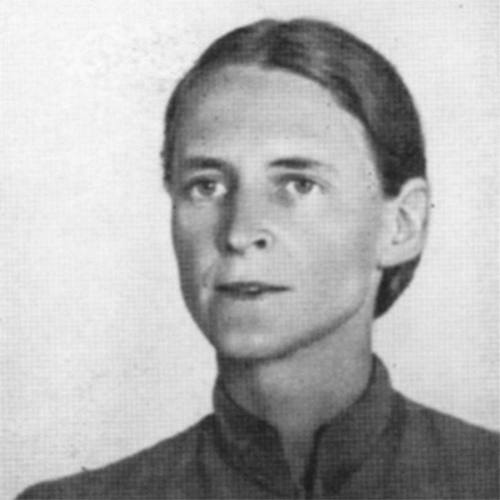Mildred Fish-Harnack
Celebrating Wisconsin Visionaries, Changemakers, and Storytellers
Poet, Storyteller, Spy
Changemaker | Mildred Fish-Harnack | 1902 - 1943

Portrait Photograph of Mildred Fish-Harnack - University of Wisconsin Madison
Mildred Fish-Harnack was a changemaker, a poet, storyteller, and teacher born in Milwaukee, Wisconsin, in 1902. As a young girl, she learned how to read, write, and speak in both German and English. She studied literature at the University of Wisconsin–Madison. In 1926, she met economics scholar Arvid Harnack, who was from Germany, and the two married. In 1929, the couple moved to Germany, and the Great Depression began shortly after.
Life was very difficult for Germans during the Great Depression. The country faced dire economic conditions, having been forced to pay huge sums of money to other countries it had invaded during World War I. Many Germans were unhappy and wanted someone to blame for their troubles, which eventually led to the rise of Nazi leader Adolf Hitler, who unjustly blamed Jewish people for all of Germany’s problems. When he became leader of Germany, he imprisoned and murdered Jewish men, women, and children.
Mildred, Arvid, and other like-minded individuals joined together in a resistance movement against the Nazis by forming a spy organization called the Red Orchestra. These individuals risked their own safety by funneling information to foreign governments working to defeat Adolf Hitler’s tyrannical rule. When the Nazis captured a Soviet spy in August of 1942, the identities of members of the Red Orchestra were revealed and Mildred, Arvid, and 116 others were arrested.
Arvid and Mildred were put on trial in Germany in December of 1942 and were both found guilty of espionage. Arvid was sentenced to death, while Mildred was sent to a prison camp. To make an example of her, Adolf Hitler intervened in her sentencing and ordered that Mildred be put to death. Mildred, a changemaker who bravely stood up for what was right, spent her last month in prison doing what she loved, reading and translating poetry before her life came to an end on February 16, 1943. Her last words were, "And I have loved Germany so much."
*The information shared in this story can be found in the Mildred Fish-Harnack Wisconsin Historical Society Classroom Resources.
Learn More:
- PBS Wisconsin Education Biography on Mildred Fish Harnack
- University of Wisconsin Madison Mildred Fish Harnack Online Exhibit
- Mildred Fish-Harnack honored as hero of resistance to Nazi regime University of Wisconsin Madison News
